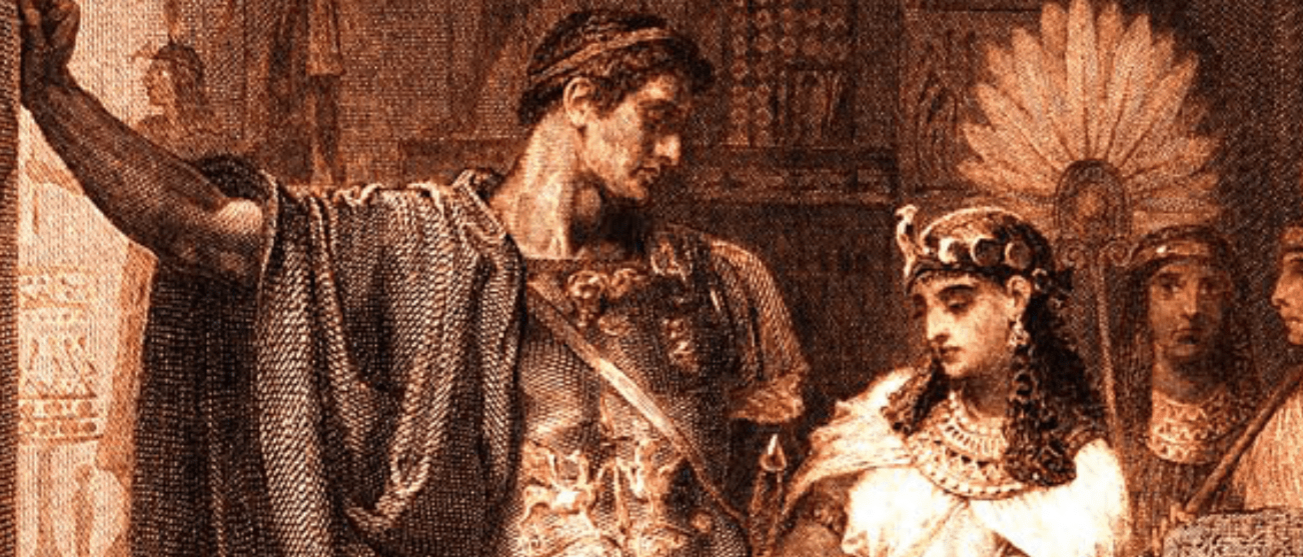Cleopatra: The Last Pharaoh
Posted on 6th January 2021
Like another famous seductress of history, Anne Boleyn, Cleopatra was not conventionally beautiful, but she had all that was required to make her so. The Roman historian Plutarch wrote: "Her beauty was not in itself incomparable, nor such as to strike those who saw her. What made Cleopatra attractive was her wit, her charm, and the sweetness in the tone of her voice.”
She was small in stature, had dark hair which she wore short, dark eyes, and a prominent nose, which at the time was thought of as a thing a great beauty. Indeed, it has been suggested that had her nose been a little shorter the whole history of the world may have been different. Even so, there was little prettiness in her face though her body was petite, and her breasts pert. She also possessed the allure and arrogance of majesty, and she knew how to play a man. She was also not Egyptian but of Macedonian descent, one of the Ptolemy clan established as the ruling dynasty in Egypt following the death of Alexander the Great who had conquered it in 332 BC.
She was ambitious and determined to restore to former greatness an Egypt torn apart by division and heavily in debt to Rome. She would do so diplomatically if possible but also via the bedchamber if required.

A compliant Egypt was of vital importance to Rome. With two-thirds of all land in Italy unable to be cultivated Egypt was its main supplier of grain. Without Egyptian grain Rome would starve. So, to retain Egypt within its sphere of influence was for Rome a political and strategic imperative, hence their unwavering support of the Ptolemy's.
Cleopatra's father, Ptolemy XII, whose administrative incompetence, and spendthrift concupiscence had drained the Egyptian treasury leaving it barren had remained in power only because of his close personal friendship with Rome’s leading citizen Pompey Magnus and his willingness to do his bidding. When he died in 51 BC, Cleopatra, then 18, and her brother, Ptolemy, aged 12, were named as co-rulers. They were already married as was the tradition, but it was Cleopatra's husband who had seniority and was crowned as Ptolemy XIII. It was expected that Cleopatra would subordinate herself to her brother and now her husband's wishes, but this she had no intention of doing. Indeed, so determined was she to govern in her own right that Ptolemy's Chief Advisor, the eunuch Pothinus, had her removed from power altogether and she was forced to flee Alexandria along with her equally ambitious sister, Arsinoe.
Unable however to raise any significant support for a rebellion it only seemed a matter of time before both sisters were captured and dealt with accordingly. But events far away in Rome inevitably impacted upon Egypt and it would be Roman politics that would dictate Egypt's future.
Gnaeus Pompey Magnus despite being of humble origins had risen to be the most powerful man in Rome which was still formally a Republic. He ruled as part of a Triumvirate along with his friend and ambitious brother-in-law Gaius Julius Caesar and Marcus Licinius Crassus, the wealthiest man in the city. When Crassus, who had earlier defeated the slave revolt of Spartacus was captured and killed by the Parthians by having molten gold forcibly poured down his throat, Pompey and Caesar ruled as a partnership. It was a shaky alliance for both desired to rule alone and the ever-loosening bonds of friendship that joined them would soon be broken.
Pompey and Caesar had long been friends and they had at one time shared a genuine affection for one another, but their political rivalry had begun to see them drift apart. Pompey was married to Caesar's daughter, Julia. When she died in childbirth the last remaining link between them ceased to exist. Caesar was devastated at the loss of his only child, but he did not allow his grief to impede his political ambitions. In 49 BC, he led his legions, victorious from their recent campaign in Gaul, across the River Rubicon and into Italy. This was contrary to the Senate's wishes and was considered a direct challenge to Pompey's authority. The politics of Rome had descended into a naked struggle for power between two great men. At first, Pompey seemed unconcerned. He informed the Senate that all he had to do was stamp his feet on the soil of Italy and legions would flock to his banner. But his legions were untrained and inexperienced in war. Faced with the possibility of meeting Caesar's veterans in battle he abandoned Rome.
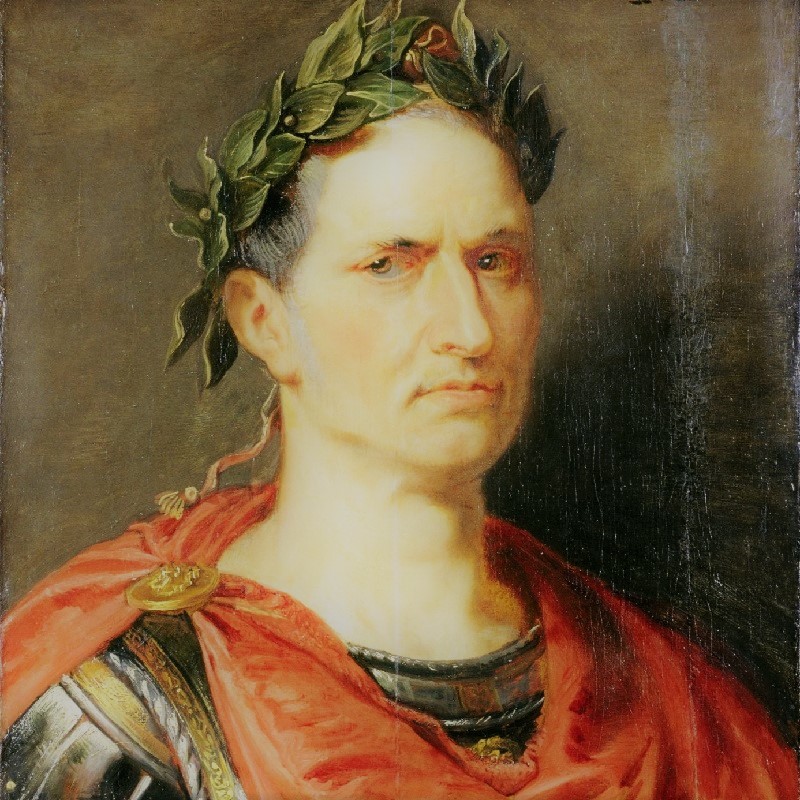
Caesar pursued his old friend relentlessly across Italy and almost cornered Pompey at Brundisium on the Adriatic coast before he disembarked his army for Greece in the nick of time. It wouldn’t be until a year later in 48 BC that the two great rivals would meet in a final showdown at the Battle of Pharsalis. Pompey whose forces by now vastly outnumbered those of Caesar had been chasing his rival all over the Greek mainland for months. The tables had been turned it seemed but in old age Pompey's powers had deserted him. He no longer struck fear into his soldiers, he no longer had their respect, they fought badly and were routed. Pompey who had escaped the battlefield carnage now fled to the one place where he thought he would be guaranteed a warm welcome, Egypt. Here, he believed, with the help of his friends the Ptolemy's and the Egyptian Army, he could renew his campaign against Caesar.
As he approached the shoreline of Egypt, he could see that a welcoming party awaited him. He thought he could even make out the young Pharaoh himself. He felt reassured but as he made to disembark, he was grabbed by a number of Romans in Egyptian pay and stabbed to death. His body was then decapitated, and his head carried back to Alexandria in a basket.
Two days later Caesar arrived in the Egyptian capital to no great fanfare. The people had been told not to cheer his arrival and there was grand reception party. It was by executing Pompey that Ptolemy had hoped to find favour with Caesar. His Chief Advisor Pothinus believed that the improved relations that would accrue from their deed would provide him with the leeway to renegotiate Egypt's crippling debt to Rome. Such hopes were soon to be dashed. Upon being presented with Pompey's severed head, Caesar exploded in rage. He poured scorn and shame upon the Ptolemy's and demanded that Pompey's killers be brought to justice. His fury may have been a little feigned for Pompey's death had removed the problem of what to do with him, but his sense of outrage was not. Pompey had been a Consul of Rome. Ptolemy was now an enemy, and it would be Caesar who would decide who ruled Egypt, not the eunuch Pothinus.
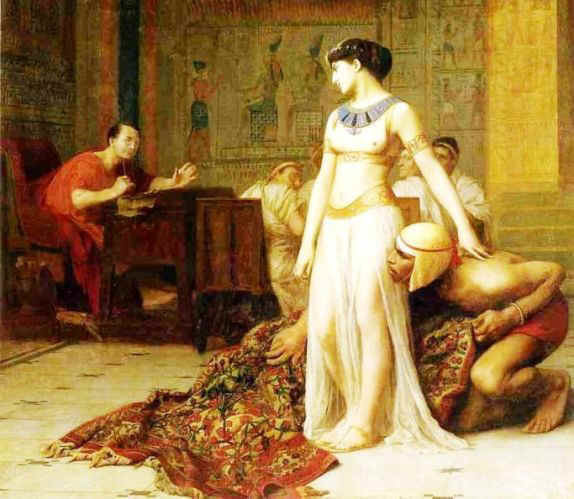
Hearing from her spies within the Royal Palace of the distance that now existed between her brother Ptolemy and the future ruler of the Roman Republic, Cleopatra decided to take advantage of the situation. In one of the great iconic moments of world history she had her servants smuggle her into the Royal Palace wrapped in a Persian rug. Her courage cannot be doubted for without question had she been discovered she would have been executed on the spot. But the ruse worked, from the moment that the rug was unrolled before Caesar to reveal the svelte and scantily clad young Queen he was hopelessly smitten.
Despite being 30 years her senior, balding and weather-beaten the aged Caesar and the young Queen became lovers that same night. As Cassius Dio wrote: "Being brilliant to look upon and to listen to she was able to subjugate everyone, even a love-sated man beyond his prime." In no time at all Cleopatra was pregnant, and on 23 June 47 BC she gave birth to a son she named, Caesarion.
Both she and Caesar were delighted. He at last had a son whilst she believed that she had secured the throne of Egypt for herself and her descendants and had re-founded Egyptian greatness by providing an heir to the Roman Empire. Whilst she may have been correct in the former she was to be sorely disabused of the latter.
Caesar now effectively embarked upon a holiday cruising down the Nile with his young, flirtatious, and fecund mistress. But he was also aware of the scandal that his affair was causing in Rome. He was after all already married to the aristocratic and well-connected Calpurnia, and the more he got to know of Cleopatra the more he began to doubt the paternity of his son. Even so, in 46 BC he brought Cleopatra and Caesarion to Rome, but his designated heir would be his great-nephew Octavian.
Before all this however Caesar still had outstanding business in Alexandria. The decision who should Pharaoh still had to be decided. Ptolemy, who had been placed under house arrest since the execution of Pothinus had managed to escape from the Royal Palace and had run into the streets urging his people to rise up against the Roman invaders. They did so and were soon joined by the Egyptian Army which rallied to its Pharaoh. Caesar who had only 2,500 men under his command was besieged in the Royal Palace for six months until reinforcements under the command of Mark Antony arrived to relieve him. With his legions in place Caesar now took the offensive and quickly defeated the Egyptian Army. He had Ptolemy drowned in the Nile.
Cleopatra was still in Rome when on 15 March, 44 BC (the Ides of March) Caesar was assassinated on the floor of the temporary Senate House. She was well-aware of the hatred most Romans felt for her and with her protector gone she quickly fled back to Egypt. On her return to Alexandria, she had her infant brother who had been named in her absence as her titular co-ruler Ptolemy XIV executed. She would rule alone, and her son Caesarion would be her designated successor.
In Rome meanwhile Caesar's assassins, including Brutus, who was rumoured to be Caesar's illegitimate son had been forced to flee the city. The most powerful man in Rome was now Caesar's right-hand man and hero of the Roman people, Mark Antony. On hearing of this news, Cleopatra determined to seduce Antony as she had Caesar.
In October, 41 BC, Antony summoned Cleopatra to meet him at Tarsus ostensibly to resolve certain outstanding political issues. This presented for Cleopatra the opportunity she had been seeking and she would seize it - she would get her man.
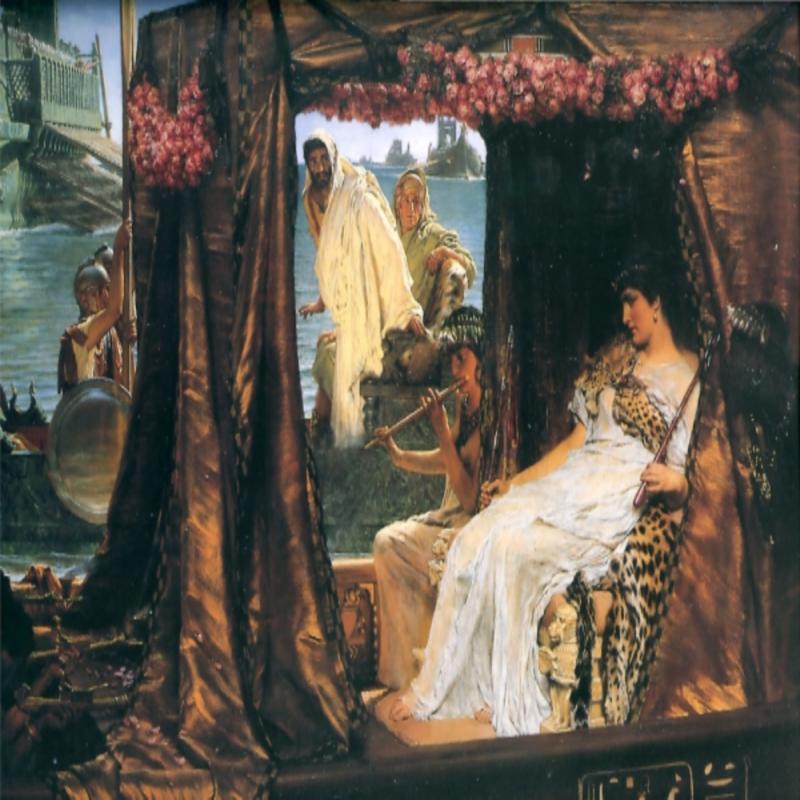
Sailing into Tarsus Harbour in her Golden Galley with its purple sails and silver oars, rowed by female servants and accompanied by her near-naked handmaidens she reclined under a gold canopy dressed as the Goddess Aphrodite fanned by young boys posing as Cupid.
When later that day she refused to disembark and meet Antony as she had been ordered to do but instead demanded that he visit her, he too was hopelessly smitten. Neglecting his duties in Rome he travelled back with her to Alexandria where he was to remain for the rest of the year.
In 41 BC, Cleopatra had Antony murder her sister Arsinoe who had been the last remaining threat to her throne. The following year she gave birth to twins by Anthony. By this time Antony's tenure as sole ruler of Rome had come to an end as much due to his own political ineptness and his ability to alienate even his most loyal supporters. He now governed as part of a Triumvir along with Caesar's designated heir Octavian and the soon to be discarded Lepidus.
By 36 BC, Antony was living in Alexandria with Cleopatra. His relationship with her was considered scandalous in Rome. He had earlier been married to Octavian's sister, Octavia, and the thought that he should desert her, a noble Roman woman, for the arms of a barbarian was intolerable. It did untold damage to his reputation and provided the opportunity for the cold, uncharismatic and otherwise unpopular Octavian to successfully plot against him.
Cleopatra's ambition was known to be boundless. She desired an Eastern Empire to not only match Rome's but surpass it. She had remarked that, "As surely as yet I shall dispense justice on Rome." And her means of doing so would be Anthony. Octavian was more than aware of this and worked hard to get Senate approval for a declaration of war against Antony and his Egyptian whore. At last in 31 BC, he succeeded.
Cleopatra was an intelligent and intuitive woman who spoke six different languages including Egyptian making her the first Ptolemy to do so for they conversed in Greek, and she was a keen mathematician and astrologer and had proved herself an able administrator. She sparkled in the company of intelligent men and had wooed Caesar as much through her wit as her sexual charms, but she struggled to control the brutish and more one-dimensional Antony. The historian Plutarch wrote:
"Plato admits to four kinds of flattery but she has a thousand. Were Antony serious or disposed to mirth, she had at every moment some new delight or charm to meet his wishes; at every turn she was upon him and let him escape her neither by day nor by night. She played dice with him, drank with him, hunted with him, and when he exercised in arms, she was there to see him."
At one of the lavish dinners, they regularly attended she boasted to him that she would spend ten million sesterces on their next meal. Antony simply laughed, for you could feed an entire city with ten million sesterces. The following day she had a rather meagre, dull, and conventional meal served. Antony mocked her for her boast of the previous evening. Cleopatra then ordered that a cup of vinegar be brought to the table. She then removed one of her earrings and placed it in the cup letting it dissolve slowly. There were the ten million sesterces, but such was her relationship with Antony. She constantly felt the need to impress a man for whom constancy was an alien concept.
Mark Antony had been Caesar's most loyal lieutenant and he had felt aggrieved by not inheriting from his Will; but Caesar troubled by Antony's drunkenness and debauched behaviour thought that his money could be better spent elsewhere. This was a bitter blow for Antony whose father had been executed on the orders of Cicero following the failure of the Caitline Conspiracy of 71 BC leaving his family, despite being of Noble blood, relatively poor and his own behaviour as a young man guaranteed that it remained that way.
He was notorious for his whoring and drunken revelries, for vomiting in the Senate House, and for riding a chariot drawn by lions through the streets of Rome at breakneck speed. Such escapades made him a hero of the people but earned him little respect among those who counted. One man however did respect his qualities of courage, devotion, and loyalty and that man had been Caesar. Now Caesar was gone and he had no one to look up to there was no longer any restraining influence on his life.
It was Antony, along with Brutus, who gave the oration at Caesar's funeral; and it was Antony who whipped up the crowd into such a frenzy of disgust at his murder that it forced Brutus and the other assassins to flee. He would later meet and defeat them in battle cementing his and Octavian's control of Rome. He possessed, according to Plutarch, that bold masculine look, and he was determined to take what Caesar had denied him.
Living in Alexandria with Cleopatra as his Queen he was the sole ruler of Rome's Eastern Provinces and he soon set about trying to create the Empire that Cleopatra had for so long dreamed of. He annexed Cyprus and appointed their children rulers of Syria and Libya. He waged war on the Parthians and restricted grain supplies to Rome.
Cleopatra was on her way to achieving her dream of replacing the Roman world with an Egyptian one. Octavian, however, had other ideas. His forces were already mustered, and he would soon lead them to do battle with Antony and Cleopatra for control of the known world.
Their armies finally met not on land but at sea at Actium, off the coast of Greece. It was a strange choice on Antony's part for it was well known that Octavian feared Antony's abilities as a General but at sea it would be Caesar's nephew who would have the advantage. The Roman Navy was the best in the world and many of Antony's ships were dilapidated and of poor quality. But then Antony had nothing but contempt for Octavian who was certainly no soldier. During the most critical moments of their joint campaign against Brutus and Cassius he had remained in bed with a nervous disorder.
If it was indeed the case that Antony’s contempt for Octavian that dictated his military strategy then it was to prove a fatal error, for Octavian who was once more laid low by a mysterious illness on the eve of battle had relinquished command to his friend Marcus Vipsanius Agrippa, an aggressive and able General competent on both land and sea and who was not in awe of Antony's abilities or reputation.

As Antony's ships were being systematically destroyed in their feeble attempts to break the Roman line, Cleopatra who had led the Egyptian Fleet in support of him panicked and fled. Seeing Cleopatra's famed Golden Galley sailing off into the distance, Antony left his men to their fate and sailed after her. Together they fled back to Alexandria with Octavian in pursuit.
Arriving back in Alexandria, Antony now did what he had always done best and lost himself in a haze of drunkenness and hedonism. The more sober Cleopatra implored him to prepare for the defence of the city but his contempt for Octavian had not been lessened by the defeat at Actium. He would deal with him when the opportunity presented itself, no special measures were required.
Disappointed, not to say frightened, by Antony's inertia and complacency Cleopatra now began to behave in a manner that suggested that she might be willing to make a separate peace with Octavian. She also had all the gold, jewels, and riches of Alexandria moved into a specially prepared mausoleum for safe keeping.
On 1 August, 30 BC, Octavian's army at last reached Alexandria. Antony, who had done nothing to prepare his army or rally support for his cause moved them out to meet him. Surveying the scene from high ground outside the city he first saw his navy raise their oars and surrender to Octavian without a fight. Upon witnessing this, his cavalry then deserted. With only his infantry left he decided to fight on and personally led them into battle, but it was a lost cause and they were easily defeated. He had received no Egyptian support and in a rage, he returned to Alexandria declaring that Cleopatra had betrayed him. With no army left to fight with he challenged Octavian to decide the issue in personal combat. Unsurprisingly, Octavian declined.
In the meantime, terrified of Antony's reaction to events and frightened for her life, Cleopatra fled to the Mausoleum and locked herself in. She then ordered her servants to inform Antony that she had committed suicide. Upon hearing the news Antony burst into tears and cried "then there is no reason to live." He unsheathed his sword and plunged it deep into his stomach. Before he died, he was informed that Cleopatra had not committed suicide but was in fact still alive. He ordered that he be taken to her immediately. Secreted in her mausoleum Cleopatra refused to open the doors for fear of Octavian's troops rushing in and Antony had to be hauled in through a window on a hoist. Dying in her arms his last words were those of forgiveness.
Despite Octavian's reassurances that she would be well-treated if she gave herself up, Cleopatra was under no illusions as to the fate that awaited her. She would be stripped naked and paraded through the streets of Rome in chains to be abused and spat upon by a baying mob, just as her sister Arsinoe had been. She resolved instead to take her own life.
The following day she opened the doors of the Mausoleum to Octavian. At their first meeting she prostrated herself naked at his feet and begged for her and her children's life. Octavian, who even at the best of times lacked warmth, did not respond. But then she was only buying time. Octavian ordered her to be closely watched. In victory, however, Octavian became complacent. He allowed Cleopatra to bury Antony with full military honours and he relaxed the watch on her.
Soon after Antony’s funeral he received a letter from Cleopatra, it contained prayers, a request that she should be buried alongside Anthony, and a heartfelt plea that her children be permitted to succeed her. It was obvious what was about to occur and he dispatched soldiers to prevent it but he was too late.
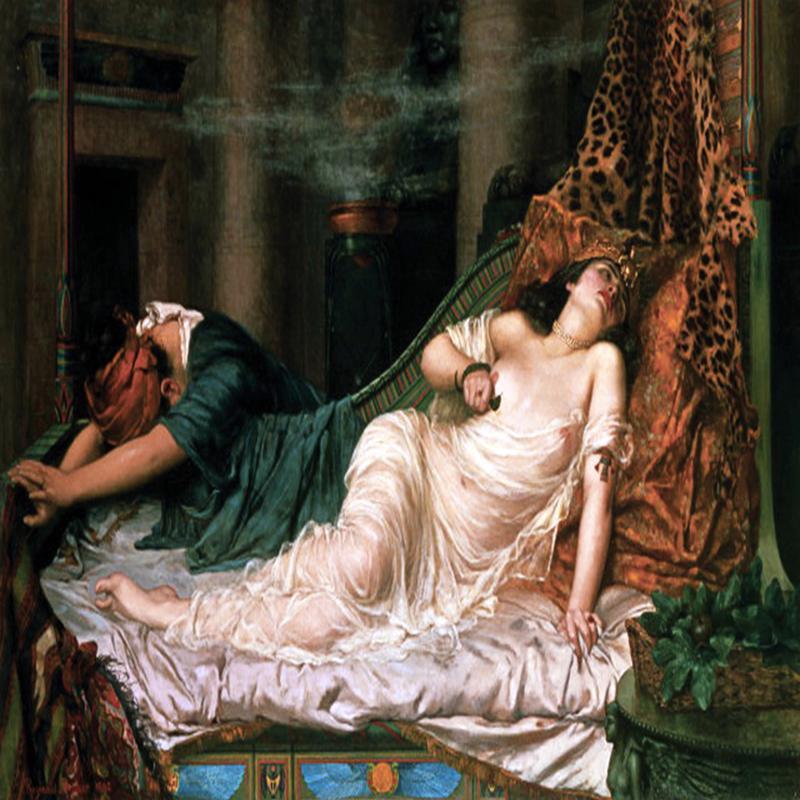
Cleopatra would die but, in a manner, befitting a Queen in the grandeur of her palace, surrounded by her riches, and doted on by adoring subjects. There would be no ugliness and little pain as she had earlier ordered that a poisonous asp be brought to her in a bowl of figs.
The asp was not held to her breast as has been depicted since the puncture wounds were found to be on her arm. Regardless, by the time Octavia’s soldiers arrived she was already dead, lying naked upon a gold bed surrounded by jewels and ornaments. At her feet lay her servants, Iras and Charmion.
Iras had already joined her mistress, but Charmion still lived barely, and an angry soldier demanded to know of her, “Was this well done of your lady?" With virtually her last breath Charmion replied, "Extremely well done, now she is dead and has become the descendant of so many kings."
Tagged as: Ancient & Medieval, Women
Share this post:





